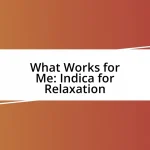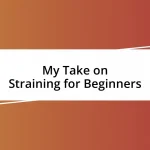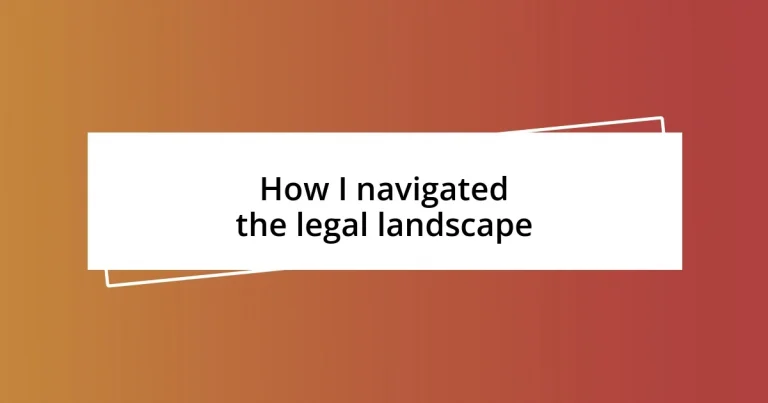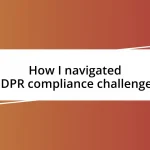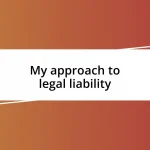Key takeaways:
- Breaking down complex legal concepts and asking questions fosters clarity and confidence in understanding the legal landscape.
- Utilizing reliable legal resources, including databases and peer support, streamlines the research process and enhances comprehension.
- Building a flexible legal strategy that incorporates risk assessment and adaptability improves the ability to navigate challenges effectively.
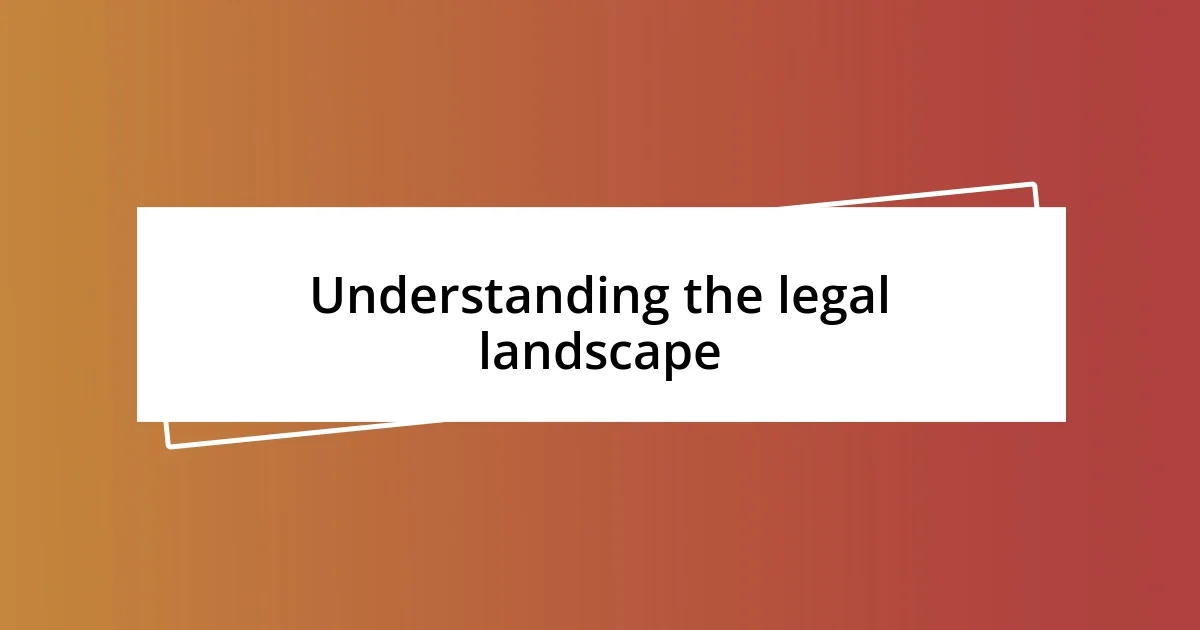
Understanding the legal landscape
Understanding the legal landscape is often like learning a new language; it can be confusing and overwhelming at first. I remember sitting in my first law class, feeling like I was drowning in a sea of jargon. Why does every field have its own set of terms that seem designed to keep outsiders at bay?
As I navigated this unfamiliar terrain, I realized that breaking down complex concepts into digestible bits was critical. For instance, understanding the difference between civil and criminal law helped me see which pathways to pursue in my own situation. When I first encountered these terms, I felt lost, but after some study, they became stepping stones rather than barriers.
There’s a pervasive sense of uncertainty that can come with dealing with legal matters. I distinctly recall a moment of clarity during a consultation with a lawyer who simplified the intricacies of a contract dispute for me. How could someone make such a labyrinthine process feel so manageable? I learned that the key was to ask questions—no matter how trivial they seemed—and truly engage in the conversation. This shift in perspective made me realize that understanding the legal landscape isn’t just about knowing the law; it’s about developing relationships and seeking clarity.
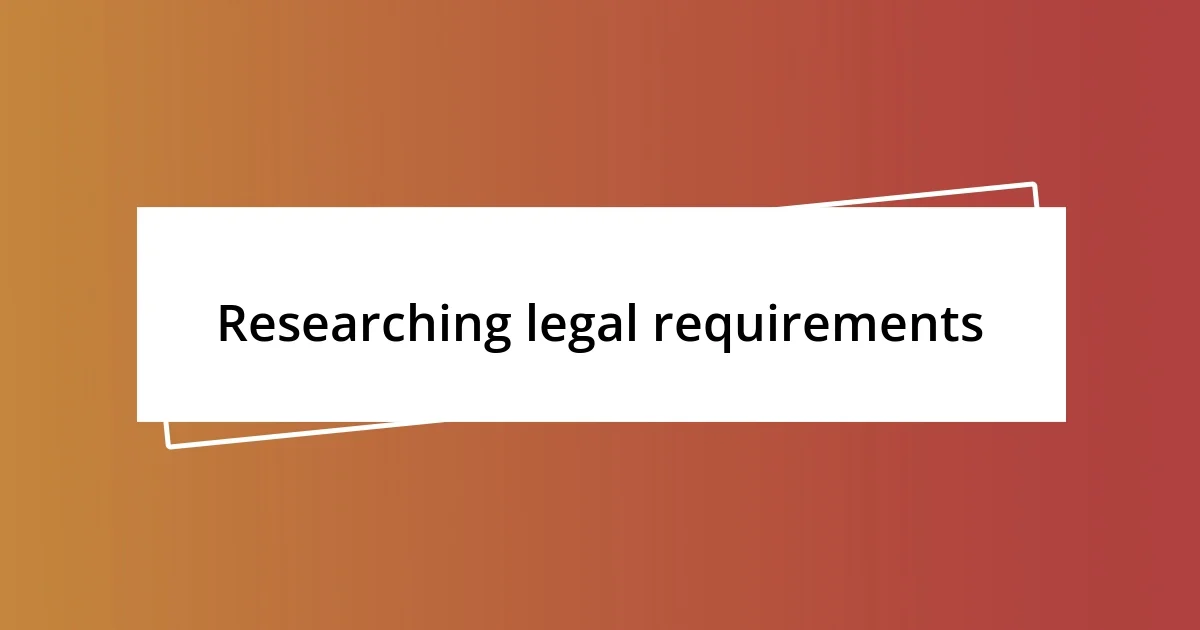
Researching legal requirements
Researching legal requirements can feel like navigating a maze, but I’ve learned that taking a methodical approach can simplify the process. Early in my journey, I stumbled upon the importance of consulting government websites, where I found a wealth of information tailored to my specific needs. I remember feeling a mix of frustration and relief as I sifted through forms and guidelines that, at first glance, seemed cryptic. But once I started piecing it all together, the puzzle became clearer.
I also found value in joining online legal forums and communities. Sharing experiences with others who faced similar challenges opened new doors of understanding for me. I vividly recall a particularly helpful discussion where someone explained the nuances of local zoning laws. It reminded me of how beneficial peer support can be in deciphering what initially appears daunting.
Creating a checklist based on my research was another game-changer. It became my compass, guiding me through the requirements. Initially, I felt overwhelmed by the details, but with each box checked, I felt a surge of confidence. It was as if the weight of uncertainty was lifting. Keeping track of requirements visually made the process much more manageable for me, and I truly believe it can help others, too.
| Research Method | Benefits |
|---|---|
| Government Websites | Comprehensive and official information tailored to local requirements. |
| Online Legal Forums | Peer support and shared experiences simplify complex concepts. |
| Checklists | Visualization of requirements boosts confidence and clarity. |
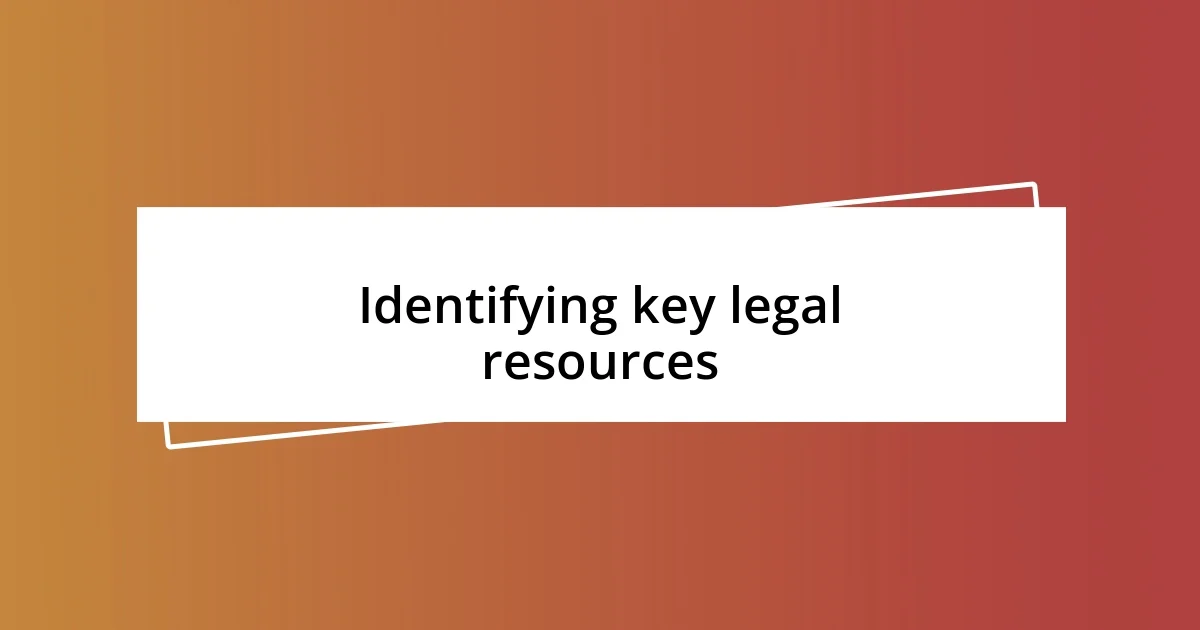
Identifying key legal resources
Identifying key legal resources was a pivotal moment for me in navigating my legal journey. Initially, I felt overwhelmed by the sheer volume of information available. It wasn’t until I started focusing on reliable sources that clarity emerged. I distinctly remember the moment I discovered legal databases—these platforms offered a treasure trove of case laws, statutes, and regulations. Tapping into these resources made me feel like an explorer uncovering hidden gems that would empower my understanding.
Some key legal resources that truly helped me include:
- Legal Databases (e.g., Westlaw, LexisNexis): These platforms are invaluable for accessing comprehensive legal research, case law, and legal articles that can guide your understanding.
- State Bar Association Websites: A crucial source for finding local resources, attorney directories, and practice guides that are tailored to your specific jurisdiction.
- Public Law Libraries: Visiting a local law library not only provided access to legal materials but also connected me with librarians who were more than willing to assist with my research needs.
With these resources at hand, I felt more grounded and equipped to tackle the nuances of the legal landscape. It was about building a toolkit that would support me through the intricacies, transforming daunting tasks into manageable challenges.
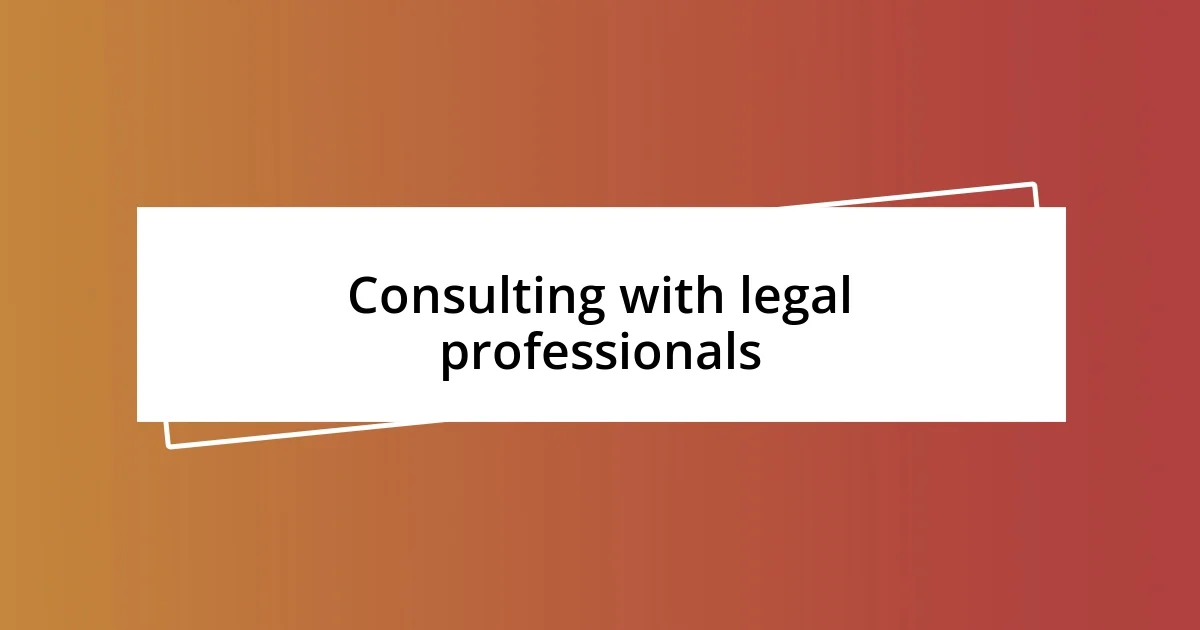
Consulting with legal professionals
Consulting with legal professionals became a cornerstone in my navigation of the legal landscape. I remember the first time I walked into a lawyer’s office—it felt both intimidating and exhilarating. The atmosphere was sleek, filled with an air of professionalism. But what struck me most was how ready these experts were to demystify the complex legal jargon that had been floating over my head. My worries faded as they patiently explained concepts that I had barely grasped during my research.
I learned that asking the right questions is essential. For example, during one consultation, I inquired about the potential pitfalls of my project. The lawyer’s response was eye-opening; they shared real-world examples of clients who had faced challenges similar to mine, putting into perspective just how crucial expert advice can be. It made me realize that I wasn’t just paying for information; I was investing in wisdom shaped by experience.
After a few consultations, I noticed a pattern: legal professionals often provided insights I hadn’t considered. One lawyer suggested I explore alternatives to formal litigation, which completely transformed my approach to resolving conflicts. And honestly, has there ever been a moment where the unexpected solution directed you on a smoother path? I felt empowered, knowing I had navigated from confusion to clarity with the help of a professional guide by my side.
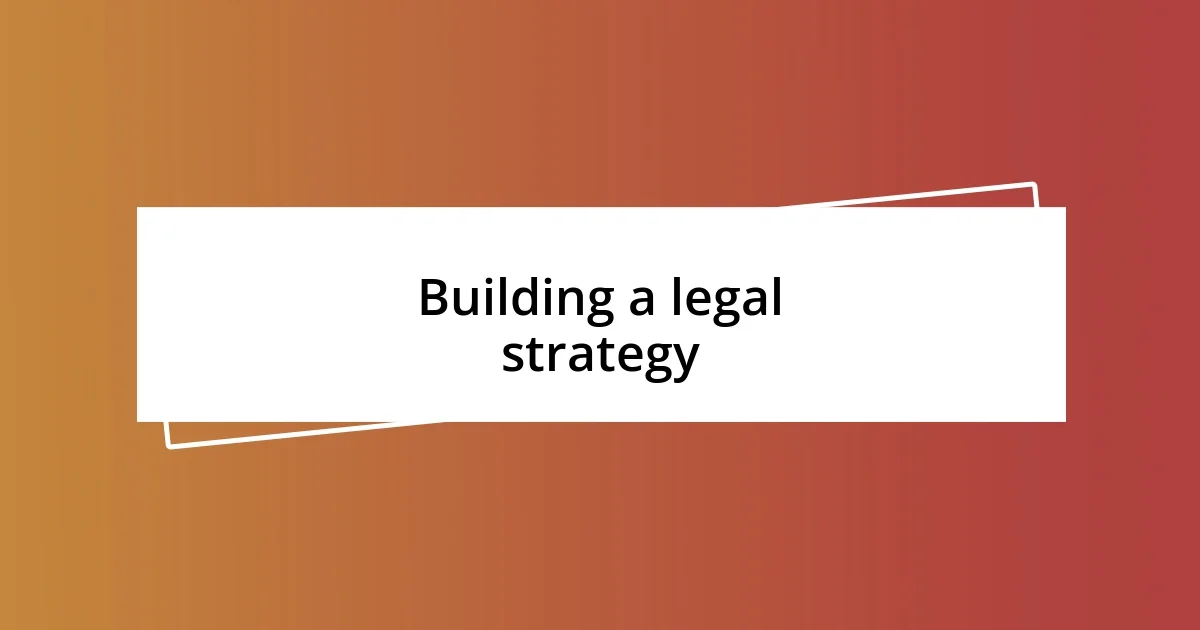
Building a legal strategy
Building a legal strategy required me to take a step back and assess my goals thoughtfully. I recall spending a weekend poring over my options, drafting a clear outline of my objectives and concerns. This exercise was more than just an academic task; it allowed me to articulate what success looked like for me. Have you ever taken the time to map out your legal journey? It opens up a world of clarity that can change the way you perceive complex issues.
As I delved into this strategy, prioritizing potential risks emerged as a vital step. One afternoon, I sat with a cup of coffee, evaluating past cases that mirrored my situation. It struck me how easily I could have overlooked key vulnerabilities. Taking the time to outline these risks not only prepared me for possible setbacks but also equipped me with a proactive mindset. What if I hadn’t identified those risks early on? I shudder to think about the disorder it could have led to.
I also discovered the importance of flexibility in my legal strategy. When I first drafted my plan, I felt committed to a single course of action. However, as I consulted lawyers and field experts, it became clear that adjustments were necessary for optimal outcomes. Embracing this adaptability transformed my approach; I learned that the ability to pivot when new information arose was an asset rather than a setback. Isn’t it invigorating to realize that a well-structured strategy can remain fluid and still lead you toward your goals?
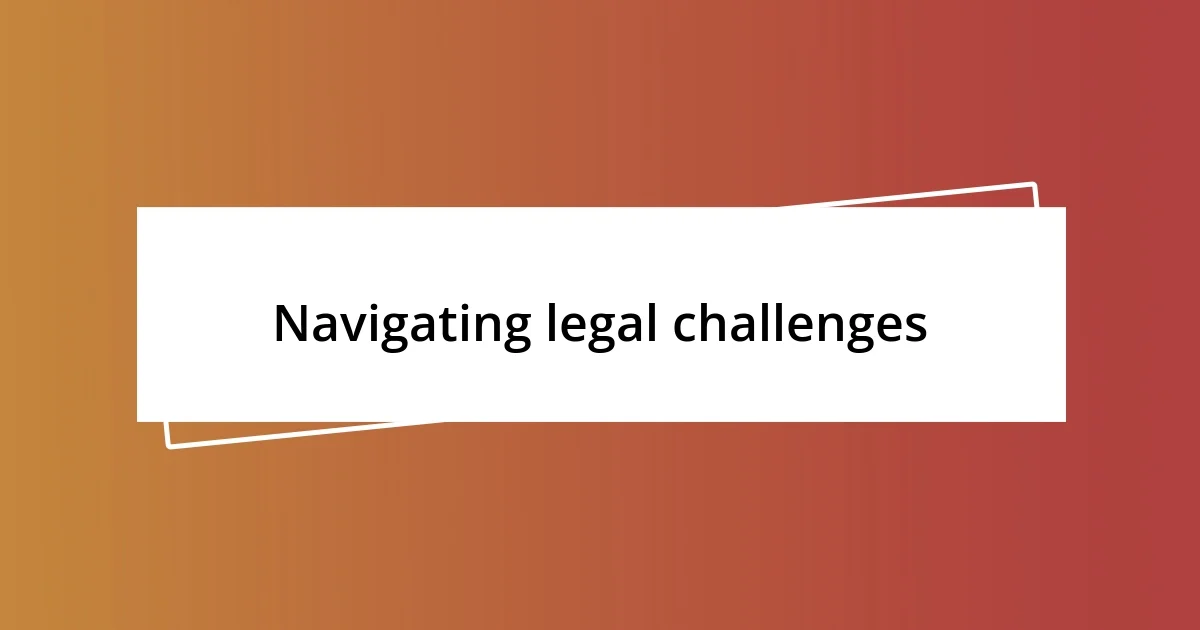
Navigating legal challenges
Navigating legal challenges often feels like trying to find your way through a dense fog. I vividly recall one particularly overwhelming moment when I faced an unexpected legal hurdle that threatened to derail my plans. It was a sobering experience, reminding me how crucial it is to stay informed and adaptable. Have you ever felt that sinking feeling when new obstacles crop up? I learned that tackling these challenges head-on, rather than avoiding them, could lead to surprising solutions.
As I navigated through these complexities, the importance of a support system became clear. While I consulted legal professionals, I also leaned on mentors who had faced similar issues. Their stories not only reassured me but also provided practical insights on overcoming roadblocks. One evening, chatting over dinner, a mentor shared how they successfully navigated a licensing dispute with creativity and tenacity. This reinforced the idea that legal challenges can sometimes be opportunities in disguise if approached with the right mindset.
Flexibility proved to be my greatest ally during this journey. I often found myself reassessing my course as new information surfaced or as circumstances shifted. There were moments I resisted change, feeling comfortable with my initial plan, but embracing adjustment often led to more effective strategies. I ask you, how often do we cling to an idea simply because it’s familiar? Once I learned to release that attachment, I started navigating those legal waters with far more confidence and clarity.
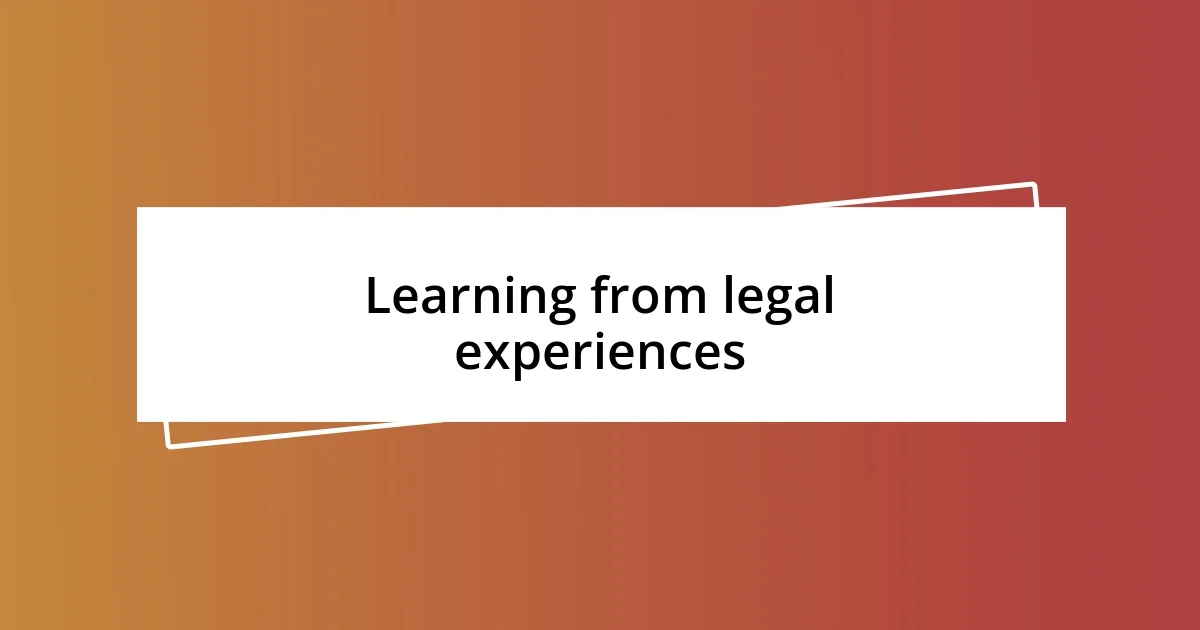
Learning from legal experiences
Learning from legal experiences has been both challenging and enlightening. One instance that stands out for me was when I had to sort through a tangled dispute over a contract. I remember pouring over every clause while feeling a mix of frustration and determination. It was here that I learned the value of attention to detail. Have you ever felt that gnawing anxiety when something seems off? That experience taught me to trust my instincts and be meticulous; it transformed how I approached legal documents from that day forward.
Another crucial lesson arose during a collaborative negotiation. Initially, I entered with a firm stance, believing it was a win-or-lose situation. But then I listened to some seasoned colleagues who suggested focusing on common ground instead of sticking rigidly to my position. I can still recall the moment it clicked for me—what if cooperation could yield far more creative solutions? Embracing this mindset not only led to a successful resolution but also enriched my understanding of negotiation dynamics. Isn’t it fascinating how shifting one’s perspective can open doors to collaboration and mutual benefit?
Ultimately, the most profound learning comes from reflection. After a difficult legal chapter concluded, I took the time to jot down my thoughts and experiences. I remember feeling a sense of closure as each insightful realization flowed out onto the page. Writing about these moments not only solidified my understanding but also prepared me for future endeavors. Have you ever considered the impact of reflection on your growth? That exercise revealed that learning from our legal experiences isn’t just about overcoming present challenges; it’s about building a foundation for future success.


